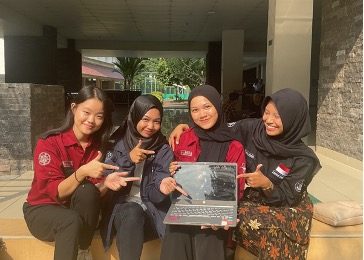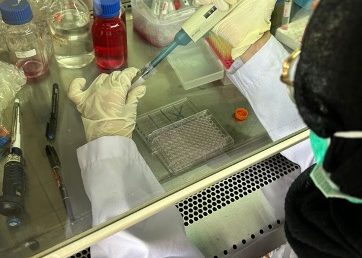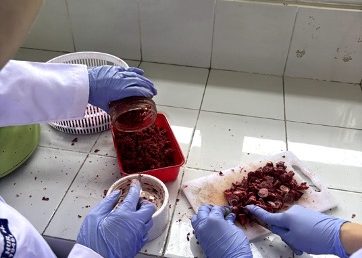Universitas Gadjah Mada students Ribka Wijayanti and Dwina Aulia (Dentistry 2022), Anisah Qurrotu Aini (Biology 2022), and Naila Nurfadhilah (Pharmacy 2022) conducted research on the potential of Dayak onion as an antiproliferative and apoptosis-inducing agent for human tongue cancer cells – under the guidance of Prof. drg. Supriatno, M.Kes., MD.Sc., Ph.D..
Dayak onion (Eleutherine bulbosa (Mill.) Urb.) is a medicinal herb commonly used by the indigenous Dayak people and can be cultivated in various regions. Besides health benefits, this research also positively impacts the local economy. This research focuses on developing a natural therapy for tongue cancer by addressing the shortcomings of existing therapy. Plant-derived exosome-like nanoparticles, or PDENs, from Dayak onion, serve as a drug delivery method derived from Dayak onion exosomes.
“Cancer occurs due to the activity of proto-oncogenes, leading to excessive cell proliferation and the inhibition of tumor suppressor genes. We used PDENs because they have proven to inhibit proliferation and induce apoptosis in various types of cancer. Based on this, we wanted to explore its potential for tongue cancer treatment, ‘’ explained Ribka.
Ribka noted that using PDENs from Dayak onion induced apoptosis (programmed cell death) in cancer cells and reduced the number of proliferating cells.
“Dayak onions have a powerful IC50 equivalent to 38.97 ppm. This value is superior to other medicinal plants, such as soursop leaves and bajakah roots. The various therapeutic compounds in Dayak onion cannot be utilized as therapeutic agents using common extraction methods. However, with PDENs, all therapeutic compounds can be delivered to the target organ,” Anisah elaborated.
This research project was submitted as part of the Student Creativity Program in Exact Research (PKM-RE) with research funding support from the Ministry of Education, Culture, Research, and Technology (Kemendikbudristek) to conduct in-depth research and analysis on the potential of PDENs extract from Dayak onion. It hoped that this interdisciplinary collaborative research can inspire further exploration of natural potentials to improve human quality of life. [Writer: AQA]




